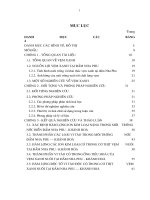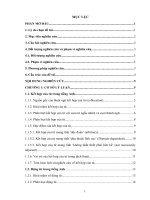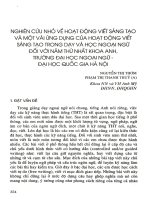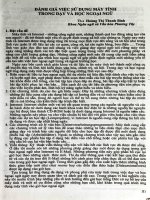NGHIÊN CỨU SỰ TÍCH HỢP CỦA GIAO TIẾP LIÊN VĂN HÓA TRONG DẠY VÀ HỌC NGOẠI NGỮ
Bạn đang xem bản rút gọn của tài liệu. Xem và tải ngay bản đầy đủ của tài liệu tại đây (484.85 KB, 8 trang )
<span class='text_page_counter'>(1)</span><div class='page_container' data-page=1>
<b>EXPLORING THE INTERCULTURAL COMMUNICATIVE COMPETENCE </b>
<b>INTERGRATION IN FOREIGN TEACHING AND LEARNING </b>
<b> Bui Thi Huong Giang </b>
<i><b> </b>Department of International Cooperation – Thai Nguyen University </i>
<b>ABSTRACT </b>
For more than 30 years, English has played a significant role in various Vietnamese contexts as a
mode of international communication. At present, English is officially taught to Vietnamese
learners from grade three onwards. Previously, English language teaching and learning had long
focused on putting in great efforts to develop the functions and uses of English. The fact is that
despite being proficient in English, most Vietnamese students who graduate from a university are
unable to communicate effectively in English with co-workers from different cultural
backgrounds. Therefore, the object of the current research is to analyze the viewpoints of the
second and third year English major students about intercultural competence development in
foreign language teaching and learning classroom at School of Foreign Languages, Thai Nguyen
University. The research findings show that learners do not get sufficient cultural information and
seldom or never take part in disscussions about values, beliefs, attitudes, and behaviour of people
living in other cultures. Obviously, the possibilities of developing intercultural competence are not
yet fully exploited in foreign language teaching and learning classroom. Therefore, a considerably
stronger focus on the English language teaching and learning process should be given to the
increase of learners‟ intercultural competence in accordance with the present day requirements and
goals of education.
<i><b>Keywords: intercultural communicative competence; intercultural competence; foreign language </b></i>
<i>teaching and learning; English major students; School of Foreign Languages; Thai Nguyen University </i>
<i><b>Received: 20/02/2019 ; Revised: 26/3/2019; Approved: 07/5/2019 </b></i>
<b>NGHIÊN CỨU SỰ TÍCH HỢP CỦA GIAO TIẾP LIÊN VĂN HĨA </b>
<b>TRONG DẠY VÀ HỌC NGOẠI NGỮ </b>
<b> Bùi Thị Hương Giang </b>
<i> Ban Hợp tác Quốc tế - ĐH Thái Nguyên </i>
TÓM TẮT
Hơn 30 năm qua, tiếng Anh đã đóng một vai trị quan trọng như là một ngôn ngữ giao tiếp quốc tế
ở Việt Nam. Hiện tại, tiếng Anh được dạy chính thức cho người học ở Việt Nam bắt đầu từ lớp ba.
Trước đây, việc dạy và học tiếng Anh thường tập trung vào các chức năng và cách sử dụng của
tiếng Anh. Thực tế cho thấy mặc dù thành thạo tiếng Anh nhưng hầu hết sinh viên Việt Nam sau
khi tốt nghiệp đại học không thể giao tiếp bằng tiếng Anh hiệu quả với đồng nghiệp từ các nền văn
hóa khác nhau. Do đó, mục tiêu của nghiên cứu này là phân tích quan điểm của sinh viên chuyên
ngành tiếng Anh năm thứ hai và thứ ba về việc phát triển năng lực liên văn hóa trong dạy và học
ngoại ngữ tại Khoa Ngoại ngữ, Đại học Thái Nguyên. Các kết quả nghiên cứu cho thấy người học
khơng có đủ thơng tin văn hóa và rất hiếm khi hoặc không bao giờ tham gia vào những bàn luận về
các giá trị, niềm tin, thái độ và hành vi của những người sống trong các nền văn hóa khác. Rõ ràng,
khả năng phát triển năng lực liên văn hóa chưa được khai thác triệt để trong lớp học và dạy ngoại
ngữ. Do đó, quá trình dạy và học tiếng Anh cần tập trung mạnh mẽ hơn vào phát triển năng lực
liên văn hóa phù hợp với các yêu cầu và mục tiêu giáo dục hiện nay.
<i><b>Từ khóa: giao tiếp giao văn hóa; năng lực liên văn hóa; dạy và học ngoại ngữ; sinh viên chuyên </b></i>
<i>ngữ; Khoa Ngoại ngữ; Đại học Thái Nguyên </i>
<i><b>Ngày nhận bài: 20/02/2019; Ngày hoàn thiện: 26/3/2019; Ngày duyệt đăng: 07/5/2019 </b></i>
Email:
</div>
<span class='text_page_counter'>(2)</span><div class='page_container' data-page=2>
<b>1. Introduction </b>
One of the most significant changes over the
past decades has been the recognition of the
cultural dimension as a key component of
language studies. This has transformed the
nature of the experience of teaching and
learning languages to a great extent and the
traditional aim of developing linguistic skills
modeled on the norms of native speakers has
lost ground. According to the intercultural
model, language are related to the cultures,
communities and societies that use them for
communication and language learners should
be encouraged to become competent
intercultural speakers [1].
There is no doubt that we are living in time of
great change. As we educators prepare our
students for the 21st century, we are aware of
many changes occurring globally. Population
mobility continues throughout the world at an
all-time high in human history, bringing
extensive cross-cultural contact among
diverse language and cultural groups. Policy
makers include intercultural objectives in
curricula, and teachers find themselves faced
with the challenge of promoting the
acquisition of intercultural competence
through their teaching. This is true for
teachers of a diversity of subjects. It is
definitely true for teachers of foreign
languages. Foreign language education is, by
definition, intercultural. Bringing a foreign
language to the classroom means connecting
learners to a world that is culturally different
from their own. Hence, all foreign language
educators are now expected to exploit this
potential and promote the acquisition of
intercultural competence (IC) in their
learners. Therefore, the purpose of the present
research is to focus and analyze specifically
on the second and third year English major
students‟ viewpoints of intercultural
competence development in foreign language
teaching and learning classroom at School of
Foreign Languages, Thai Nguyen University
(SFL, TNU).
<b>2. Literature review </b>
Understanding the nature of the relationship
between language and culture is central to the
process of learning another language. In actual
language use, it is not the case that it is only
the forms of language that convey meaning. It
is language in its cultural context that creates
meaning: creating and interpreting meaning is
done within a cultural framework. Learning to
communicate in an additional language
involves developing an awareness of the ways
in which culture interrelates with language
whenever it is used [2].
The notion of intercultural communicative
competence (ICC) has been developing since
the 1990s. Significant studies on FLT with
respect to ICC can be found particularly
through the multi-layered work of Michel
Byram and Lies Sercu. As pointed out by
Byram et al. [3], language teaching has been
profoundly influenced by linguistics and there
is still lack of good practice and inadequate
attention is paid to the intercultural element in
teacher education. Correspondingly, as stated
by Sercu Sercu et al. [4], foreign language
teaching is, by definition, intercultural;
therefore, foreign language teachers face the
challenge of promoting the acquisition of IC
in their practice.
</div>
<span class='text_page_counter'>(3)</span><div class='page_container' data-page=3>
people use for communication, is intertwined
with culture, community, and society.
Consequently, in order for their students to
become competent intercultural speakers,
teachers should promote ICC among English
language learners [5]. This process becomes
an essential responsibility of English teachers
who enable their students to succeed when
communicating in English with people from
different cultural backgrounds.
<b>3. Methodology </b>
The participants of present study were 178
students of the second and third year
English-majors at School of Foreign Languages, Thai
Nguyen University in 2018. Data for the
present study, which is descriptive in nature,
were collected in 2018 academic year by
means of a questionnaire adapted by Sercu et
al. [4]. The questionnaire aimed to investigate
the students viewpoints of the development of
intercultural competence in English language
learning. Data collected from the
questionnaire were analyzed by taking the
frequency counts for each question.
<b>4. Findings and discussions </b>
In the first questionnaire, students were asked to
indicate their viewpoints about the development
of intercultural competence in English language
teaching and learning and the statements are
ranked on a 5 point Likert scale ranging from
<b>„always‟ to „never‟. The data of the students‟ </b>
questionnaire indicate that development of
intercultural skills received less attention of the
learners indicated „very often‟ about developing
intercultural skills in the foreign language
teaching/learning classroom and most of the
students stated that they rarely developed
intercultural skills in the foreign language
teaching/learning classroom. „Looking for
solutions of intercultural conflict situations in
the foreign language classroom‟ (61.2%) was
ranked most and „getting new information about
your own culture in the foreign language
classroom‟ (40.4%) was ranked least. The
research data reflected the unfavourable
situation for the development of learners‟
intercultural competence (see Table 1).
<i><b>Table 1. Students’ viewpoints of skills dimension of intercultural competence development </b></i>
<i><b>Students’ viewpoints of skills dimension </b></i>
<i><b>of intercultural competence development </b></i>
<b>5 </b> <b>4 </b> <b>3 </b> <b>2 </b> <b>1 </b>
<b> n % </b> <b> n </b> <b>% </b> <b> n </b> <b>% </b> <b> n </b> <b>% </b> <b> n </b> <b>% </b>
1. Do you look for solutions of
intercultural conflict situations in the
foreign language classroom?
0 0.0 19 10.7 45 25.3 109 61.2 5 2.8
2. Do you learn to handle intercultural
conflict situations in the foreign
language classroom?
0 0.0 14 7.9 36 20.2 108 60.7 20 11.2
3. Do you speak about the etiquette of
other cultures in the foreign language
classroom?
0 0.0 16 9.0 42 23.6 102 57.3 18 10.1
4. Do you learn to handle intercultural
contact situations in the foreign language
classroom?
0 0.0 24 13.5 56 31.5 88 49.4 10 5.6
5. Do you get new information about
your own culture in the foreign language
classroom?
5 2.8 29 16.3 64 36.0 72 40.4 8 4.5
6. Do you perform reflection on cultural
differences orally in the foreign language
classroom?
0 0.0 16 9.0 58 32.6 89 50.0 15 8.4
7. Do you perform reflection on cultural
differences in writing in the foreign
language classroom?
</div>
<span class='text_page_counter'>(4)</span><div class='page_container' data-page=4>
<i><b>Students’ viewpoints of skills dimension </b></i>
<i><b>of intercultural competence development </b></i>
<b>5 </b> <b>4 </b> <b>3 </b> <b>2 </b> <b>1 </b>
<b> n % </b> <b> n </b> <b>% </b> <b> n </b> <b>% </b> <b> n </b> <b>% </b> <b> n </b> <b>% </b>
8. Do you learn to reflect on cultural
differences in the foreign language
classroom?
0 0.0 17 9.6 52 29.2 100 56.2 9 5.1
<i><b>5-always 4-often 3-sometimes 2-rarely 1-never </b></i>
Learners were asked to answer eight questions aimed at discovering to what extent classroom
practices regarding knowledge dimension of intercultural competence were carried out in foreign
language teaching/learning classroom in the second section of the questionaire (see Table 2).
<i><b>Table 2. Students’ viewpoint of knowledge dimension of intercultural competence </b></i>
<i><b>Students’ viewpoint of knowledge </b></i>
<i><b>dimension of intercultural </b></i>
<i><b>competence </b></i>
<b>5 </b> <b>4 </b> <b>3 </b> <b>2 </b> <b>1 </b>
<b> n </b> <b>% </b> <b> n </b> <b>% </b> <b> n </b> <b>% </b> <b> n </b> <b>% </b> <b> n </b> <b>% </b>
1. Do you provide information about
shared values and beliefs in the
foreign language classroom?
8 4.5 7 3.9 22 12.4 14 7.9 127 71.3
2. Do you discuss values and beliefs
of people living in other culture in
the foreign language classroom?
0 0.0 5 2.8 6 3.4 135 75.8 32 18.0
3. Do you discuss the significance of
values and beliefs in one‟s life in the
foreign language classroom?
0 0.0 2 1.1 8 4.5 122 68.5 46 25.8
4. Do you discuss the impact of
foreign culture in the foreign
language classroom?
20 11.2 28 15.7 42 23.6 68 38.2 20 11.2
5. Do you get information in the
foreign language classroom about
daily life and routines of the foreign
country?
11 6.2 22 12.4 52 29.2 83 46.6 10 5.6
6. Do you get information in the
foreign language about the political
conditions of the foreign country?
0 0.0 6 3.4 15 8.4 53 29.8 104 58.4
7. Do you get information in the
foreign language about the
geography of the foreign country
0 0.0 0 0.0 24 13.5 92 51.7 62 34.8
8. Do you get information in the
foreign language classroom about
the history of the foreign country?
0 0.0 6 3.4 15 8.4 102 57.3 55 30.9
<i><b>5-always 4-often 3-sometimes 2-rarely 1-never </b></i>
</div>
<span class='text_page_counter'>(5)</span><div class='page_container' data-page=5>
0%. Most of the students‟ answers points out that providing „information about shared values and
beliefs in the foreign language classroom‟ takes the first rank as seldom or never classroom
activity. Following is getting „information in the foreign language about the political conditions
of the foreign country‟ with 58.4% and „information in the foreign language about the geography
of the foreign country‟ with 34.8%.
The analysis of the research data revealed the learners‟ viewpoints of attitudinal dimension as
shown in Table 3.
<i><b>Table 3. Students’ viewpoint of attitudinal dimension of intercultural competence development </b></i>
<i><b>Students’ viewpoint of attitudinal </b></i>
<i><b>dimension of intercultural competence </b></i>
<i><b>development </b></i>
<b>5 </b> <b>4 </b> <b>3 </b> <b>2 </b> <b>1 </b>
<b> n </b> <b>% </b> <b> n </b> <b>% </b> <b> n </b> <b>% </b> <b> n </b> <b>% </b> <b> n </b> <b>% </b>
1. Do you learn to empathize with
people living in other cultures in the
foreign language classroom?
0 0.0 25 14.0 46 25.8 72 40.4 35 19.7
2. Do you take part in discussions about
your own culture? 0 0.0 21 11.8 35 19.7 89 50.0 33 18.5
3. Do you take part in discussions in the
foreign language classroom about
respecting other/different culture?
0 0.0 29 16.3 42 23.6 76 42.7 0 0.0
4. Do you take part in discussions in the
foreign language classroom about
respecting own culture?
0 0.0 54 30.3 78 43.8 107 60.1 0 0.0
5. Do you take part in discussions in the
foreign language classroom about
different cultural values?
0 0.0 34 19.1 98 55.1 46 25.8 0 0.0
6. Do you take part in discussions in the
foreign language classroom about
stereotypes?
0 0.0 33 18.5 87 48.9 58 32.6 0 0.0
7. Do you develop attitudes of openness
and tolerance towards other people and
cultures?
0 0.0 56 31.5 98 55.1 24 13.5 0 0.0
<i><b>5-always 4-often 3-sometimes 2-rarely 1-never </b></i>
As the most favourable classroom activities
related with teaching culture in the attitudinal
dimension, the stuents indicated „discussions
about attitudes of openness and tolerance
towards other people and cultures‟ (31.5%),
„discussions about about respecting own
culture s‟ (30.3%). As the second favourite
classroom practices, „discussions about the
foreign language classroom about different
cultural values‟ (19.1%), „discussions about
the foreign language classroom about
stereotypes‟ (18.5%) and „about respecting
other/different culture‟ (16.3%) were chosen.
According to the respondents‟ opinion, least
attention during EFL classes was paid to
„discussions about about your own culture‟
</div>
<span class='text_page_counter'>(6)</span><div class='page_container' data-page=6>
more attention from teachers in order to
strengthen the learners‟ abilities to manage
intercultural situations better. The results of
the study clearly reveals that there is a lack
attention of the second and third year English
major students at SFL on the intercultural
competence development Therefore, the
students‟ understanding of cultural elements
should be integrated more in the curriculums
in order to raise the students‟ awareness of the
role of intercultural competence in their study
and career. Learners‟ cultural awareness can
be shown as their perceptions and deep
understandings of both the target language
culture and their own culture EFL teachers
should incorporate classroom activities and
projects that stress the importance of
integrating intercultural communication
aspects to dealing with different cultures and
respecting all the diversities. Teachers can
mention aspects of both the target language
culture and the source culture, and the culture
of other countries in their language
classroom. It is suggested that the deep
understanding of intercultural issues will then
make a significant contribution toward
developing EFL curriculums from an
intercultural perspective.
<b>5. Conclusion and recommendations </b>
The present study aimed to investigate the
opinions of English major students at SFL,
TNU regarding the role of teaching culture in
foreign language education and the extent to
which they incorporate cultural activities into
their classroom practices in order to train
competent intercultural speakers. The results
we have presented here suggest that
intercultural dimension in English teaching
has not been fully endorsed by the teachers.
While teaching IC is a part of planning,
teachers do not seem to implement it as an
explicit task in their classroom practice.
Given the complexity and significance of IC
in the English language teaching, to
understand the dynamics involved in the
concept of IC, teachers need to be
familiarized with the theory and available
framework that is at an advantage in
examining and clarifying the issue. They
generally prioritize language teaching
objectives over culture teaching objectives.
They try to favor the development of
openness and tolerance, but they still define
culture teaching more in terms of passing on
knowledge than providing intercultural skills.
The results show that there are opportunities.
First of all, culture teaching requires a critical
dimension. Therefore, teachers and students
need deeper knowledge of the cultural aspect
in FLT that should be anchored in the
available theories and frameworks. Secondly,
policy documents should include a clear and
applicable definition of IC and should clarify
the assessment criteria. At the moment, the
concept of IC is being left for individual
interpretation by a teacher who applies this
interpretation into his/her classroom practice.
For that reason, teachers should be
familiarized with the recent research
concerning IC and encouraged to
problematize the curriculum content about
culture teaching. Lastly, educational
authorities cannot simply introduce teachers
to “new theories” but should invest in an
in-service teacher training that builds on the
acquisition of IC and supply a teacher with
the skills, abilities and reflective attitudes that
are indispensable in teaching of IC.
REFERENCES
[1]. Alvarez, I., and Garrido, C., “Language
teacher education for intercultural
<i>understanding”, European Journal of Teacher </i>
<i>Education, 29(2), 163-179, 2006. </i>
</div>
<span class='text_page_counter'>(7)</span><div class='page_container' data-page=7>
[3]. Byram, M., Nichols, A. & Stevens, D.(eds).,
<i>Developing Intercultural Competence in </i>
<i>Practice, Clevedon: Multilingual Matters, </i>
2001.
<i>[4]. Liddicoat, A. J. & Scarino, A., Inercultural </i>
<i>Language Teaching and Learning, Malden, </i>
MA: Wiley-Blackwell, 2013.
</div>
<span class='text_page_counter'>(8)</span><div class='page_container' data-page=8></div>
<!--links-->
Nghiên cứu sự ảnh hưởng của các yếu tố văn hóa doanh nghiệp đến sự gắn bó của nhân viên làm việc tại siêu thị thuận thành
- 115
- 1
- 0








